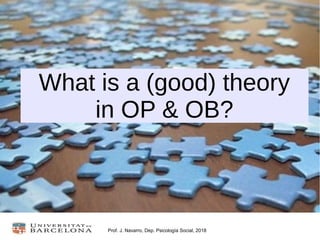
What is a (good) theory
- 1. Prof. J. Navarro, Dep. Psicología Social, 2018 What is a (good) theory in OP & OB?
- 2. Prof. J. Navarro, Dep. Psicología Social, 2018 What is a Theory (Bacharach, 1989) 'A theory is a statement of relations among concepts within a set of boundary assumptions and constraints' (p. 496) ' (..) the purpose of theoretical statements is twofold: to organize (parsimoniously) and to communicate (clearly).' (p. 496) 'The primary goal of a theory is to answer the questions of how, when, and why, unlike the goal of description, which is to answer the question of what.' (p. 498)
- 3. Prof. J. Navarro, Dep. Psicología Social, 2018 What theory is not, theorizing is (Weick, 1995) ● Theory is not some references, data, a list, a diagram or some hypothesis (as was proposed by Sutton & Stow, 1995). ● But, theorizing consist on different approximations such as doing references, having data, making a list, drawing a diagram or proposing some hypothesis.
- 4. Prof. J. Navarro, Dep. Psicología Social, 2018 Approximate theories (Merton, 1967) 1. General orientations in which broad frameworks specify types of variables people should take into account, without any specification of relantionships among these variables. 2. Analysis of concepts in which concepts are specified, clarified, and defined but not interrelated. 3. Post-factum interpretation in which ad hoc hypotheses are derived from a single observation, with no effort to explore alternative explanations or new observations. 4. Empirical generalization in which an isolated proposition summarizes the relationship between two variables, but further interrelations are not attempted.
- 5. Prof. J. Navarro, Dep. Psicología Social, 2018 The process of theorizing (Weick, 1995) ● Theory work can take a variety of forms, ● ... because theory itself is a continuum (rather than a dichotomy). ● ...because most verbally expressed theory leaves tacit some key portions of the originating insight. ● So, what we need to know is more about the context in which the theory lives. This is the process of theorizing.
- 6. Prof. J. Navarro, Dep. Psicología Social, 2018 The process of theorizing (Weick, 1995) ● The process of theorizing consist of activities like abstracting, generalizing, relating, selecting, explaining, synthesizing, and idealizing. ● These ongoing activities summarize progress, give direction, and serve as place-makers. They are vestiges of theorizing process but are not theories themselves.
- 7. Prof. J. Navarro, Dep. Psicología Social, 2018 Description vs Explanation 'The primary goal of a theory is to answer the questions of how, when, and why, unlike the goal of description which is to answer the question of what'. Bacharach, 1989, p. 498.
- 8. Prof. J. Navarro, Dep. Psicología Social, 2018 Theories in OB (Whetten, 1989) A theory must contain four essential elements: 1) answers to what the constructs are 2) how and why they are related 3) answers to who the constructs apply to and 4) where and when they are applicable. Additionally, all theories have a set of assumptions that underlie them, and boundary conditions that contain them.
- 9. Prof. J. Navarro, Dep. Psicología Social, 2018 Where do theories come from? ● From case studies and other inductive methods. ● From imaginary experiments or thought experiments. ● Borrowing from other disciplines. ● From observing and attempting to solve real-world puzzles. ● From the identification of gaps, contradictions in previous theories. ● From the attempts to integrate previous theories. AMR, Editorial, 2016.
- 10. Prof. J. Navarro, Dep. Psicología Social, 2018 Criteria for the assessment of any theory ● Falsifiability: possible to test. ● Logical Adequacy: non-tautological and specify the relationship between antecedents and consequents. ● Utility: help to explain and predict. ● Connectivity: ability to bridge gaps between previous theories. ● Transformational: evaluation of old theories under a new light.
- 11. Prof. J. Navarro, Dep. Psicología Social, 2018 Criteria for the assessment of any theory (Bacharach, 1989)
- 12. Prof. J. Navarro, Dep. Psicología Social, 2018 What is a good theory 1/2 Klein & Zedeck (2004), Kozlowski (2009), Weick (1995) ● It explains and establishes principles for how a phenomenon works. ● It is not just a graph with boxes and arrows. It goes beyond. ● It integrates the literature, providing insights about commonalities that can be exploited in future research. ● It identifies areas of disagreement and contradiction, finding ways to bridge them or pointing toward ways to competitively test them. ● It synthesizes different domains, creating novel predictions from their combination.
- 13. Prof. J. Navarro, Dep. Psicología Social, 2018 What is a good theory 2/2 Klein & Zedeck (2004), Kozlowski (2009), Weick (1995) ● It shapes research as investigators translate principles or propositions into hypotheses that are examined in a particular context. ● It generates many such research opportunities. ● It is not tested all at once. Rather, it takes an accumulation of evidence across many evaluations to map support for the theory. ● It generates many midrange theories that can be evaluated with data.
- 14. Prof. J. Navarro, Dep. Psicología Social, 2018 How to learn to build theories? ● Writing a paragraph explaining the basic idea and why it is important. ● Creating a visual representation, where relevant, of what the model looks like (e.g., a flowchart, a process model, a 2x2 matrix). ● Explaining the idea verbally. ● Creating an annotated bibliography of approximately fifty articles that explains how each article relates to your idea. ● Developing a set of propositions. ● Writing a draft of the paper that outlines the basic logic of your model. AMR, Editorial, 2016.
